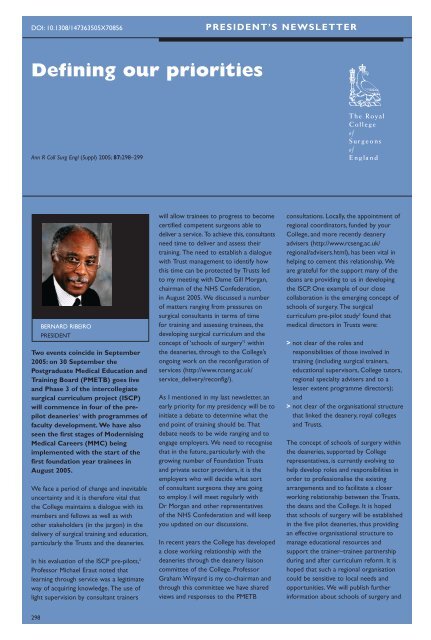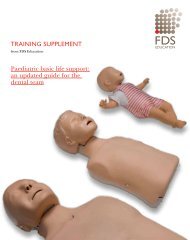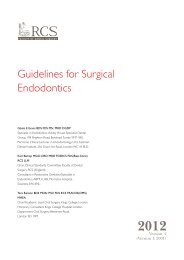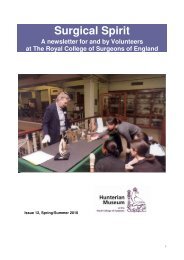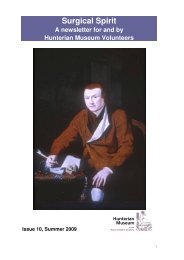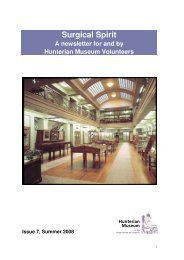Bulletin October.ps - The Royal College of Surgeons of England
Bulletin October.ps - The Royal College of Surgeons of England
Bulletin October.ps - The Royal College of Surgeons of England
You also want an ePaper? Increase the reach of your titles
YUMPU automatically turns print PDFs into web optimized ePapers that Google loves.
DOI: 10.1308/147363505X70856<br />
Defining our priorities<br />
Ann R Coll Surg Engl ( Suppl) 2005; 87:298–299<br />
Two events coincide in September<br />
2005: on 30 September the<br />
Postgraduate Medical Education and<br />
Training Board (PMETB) goes live<br />
and Phase 3 <strong>of</strong> the intercollegiate<br />
surgical curriculum project (ISCP)<br />
will commence in four <strong>of</strong> the prepilot<br />
deaneries 1 with programmes <strong>of</strong><br />
faculty development. We have also<br />
seen the first stages <strong>of</strong> Modernising<br />
Medical Careers (MMC) being<br />
implemented with the start <strong>of</strong> the<br />
first foundation year trainees in<br />
August 2005.<br />
We face a period <strong>of</strong> change and inevitable<br />
uncertainty and it is therefore vital that<br />
the <strong>College</strong> maintains a dialogue with its<br />
members and fellows as well as with<br />
other stakeholders (in the jargon) in the<br />
delivery <strong>of</strong> surgical training and education,<br />
particularly the Trusts and the deaneries.<br />
In his evaluation <strong>of</strong> the ISCP pre-pilots, 2<br />
Pr<strong>of</strong>essor Michael Eraut noted that<br />
learning through service was a legitimate<br />
way <strong>of</strong> acquiring knowledge.<strong>The</strong> use <strong>of</strong><br />
light supervision by consultant trainers<br />
298<br />
BERNARD RIBEIRO<br />
PRESIDENT<br />
PRESIDENT’S NEWSLETTER<br />
will allow trainees to progress to become<br />
certified competent surgeons able to<br />
deliver a service.To achieve this, consultants<br />
need time to deliver and assess their<br />
training. <strong>The</strong> need to establish a dialogue<br />
with Trust management to identify how<br />
this time can be protected by Trusts led<br />
to my meeting with Dame Gill Morgan,<br />
chairman <strong>of</strong> the NHS Confederation,<br />
in August 2005. We discussed a number<br />
<strong>of</strong> matters ranging from pressures on<br />
surgical consultants in terms <strong>of</strong> time<br />
for training and assessing trainees, the<br />
developing surgical curriculum and the<br />
concept <strong>of</strong> ‘schools <strong>of</strong> surgery’ 3 within<br />
the deaneries, through to the <strong>College</strong>’s<br />
ongoing work on the reconfiguration <strong>of</strong><br />
services (http://www.rcseng.ac.uk/<br />
service_delivery/reconfig/).<br />
As I mentioned in my last newsletter,an<br />
early priority for my presidency will be to<br />
initiate a debate to determine what the<br />
end point <strong>of</strong> training should be.That<br />
debate needs to be wide ranging and to<br />
engage employers. We need to recognise<br />
that in the future, particularly with the<br />
growing number <strong>of</strong> Foundation Trusts<br />
and private sector providers, it is the<br />
employers who will decide what sort<br />
<strong>of</strong> consultant surgeons they are going<br />
to employ. I will meet regularly with<br />
Dr Morgan and other representatives<br />
<strong>of</strong> the NHS Confederation and will keep<br />
you updated on our discussions.<br />
In recent years the <strong>College</strong> has developed<br />
a close working relationship with the<br />
deaneries through the deanery liaison<br />
committee <strong>of</strong> the <strong>College</strong>.Pr<strong>of</strong>essor<br />
Graham Winyard is my co-chairman and<br />
through this committee we have shared<br />
views and responses to the PMETB<br />
consultations. Locally, the appointment <strong>of</strong><br />
regional coordinators, funded by your<br />
<strong>College</strong>,and more recently deanery<br />
advisers (http://www.rcseng.ac.uk/<br />
regional/advisers.html), has been vital in<br />
helping to cement this relationship.We<br />
are grateful for the support many <strong>of</strong> the<br />
deans are providing to us in developing<br />
the ISCP.One example <strong>of</strong> our close<br />
collaboration is the emerging concept <strong>of</strong><br />
schools <strong>of</strong> surgery. <strong>The</strong> surgical<br />
curriculum pre-pilot study 3 found that<br />
medical directors in Trusts were:<br />
> not clear <strong>of</strong> the roles and<br />
responsibilities <strong>of</strong> those involved in<br />
training (including surgical trainers,<br />
educational supervisors, <strong>College</strong> tutors,<br />
regional specialty advisers and to a<br />
lesser extent programme directors);<br />
and<br />
> not clear <strong>of</strong> the organisational structure<br />
that linked the deanery, royal colleges<br />
and Trusts.<br />
<strong>The</strong> concept <strong>of</strong> schools <strong>of</strong> surgery within<br />
the deaneries, supported by <strong>College</strong><br />
representatives, is currently evolving to<br />
help develop roles and responsibilities in<br />
order to pr<strong>of</strong>essionalise the existing<br />
arrangements and to facilitate a closer<br />
working relationship between the Trusts,<br />
the deans and the <strong>College</strong>.It is hoped<br />
that schools <strong>of</strong> surgery will be established<br />
in the five pilot deaneries, thus providing<br />
an effective organisational structure to<br />
manage educational resources and<br />
support the trainer–trainee partnership<br />
during and after curriculum reform. It is<br />
hoped that such a regional organisation<br />
could be sensitive to local needs and<br />
opportunities. We will publish further<br />
information about schools <strong>of</strong> surgery and
THE ROYAL COLLEGE OF SURGEONS OF ENGLAND BULLETIN<br />
how we plan to further develop and pilot<br />
the idea but it has been encouraging to<br />
see how readily many <strong>of</strong> the deans have<br />
been to work collaboratively with us in<br />
developing this idea.<br />
In the coming months a series <strong>of</strong><br />
stakeholder meetings will be held in a<br />
number <strong>of</strong> deaneries to introduce the<br />
ISCP locally. If you receive an invitation to<br />
one <strong>of</strong> these events I urge you to attend.<br />
We will be piloting the curriculum over<br />
the next 18 months and we urgently need<br />
your views and feedback.<br />
To this end we have begun conducting<br />
information sessions to introduce the<br />
project’s faculty development<br />
programmes, which are aimed at enabling<br />
you, the surgical educators, to begin<br />
piloting the new surgical curriculum in<br />
your local deaneries, and we have started<br />
fostering opportunities for open<br />
communications between trainers,<br />
deaneries and Trusts throughout the UK.<br />
Wessex surgical educators’<br />
meeting<br />
I attended this meeting in Salisbury,<br />
organised by Mr Tim Walsh and<br />
Mr Alistair Flowerdew,with<br />
Mr David Rosin (vice-president) and<br />
representatives <strong>of</strong> the <strong>College</strong> to<br />
receive feedback on MMC and the ISCP.<br />
A variety <strong>of</strong> speakers, from senior Trust<br />
management to specialty representatives,<br />
were asked to present their hopes and<br />
concerns for the new surgical curriculum<br />
programme.<br />
On the whole,most speakers were very<br />
positive towards the key aims <strong>of</strong> the<br />
project. Speakers and delegates generally<br />
felt that the introduction <strong>of</strong> a curriculum<br />
would make training fairer and more<br />
transparent, and would identify sooner,<br />
rather than later,those ga<strong>ps</strong> in knowledge<br />
and technical skills that would need<br />
development in order to progress<br />
through training, thereby <strong>of</strong>fering<br />
mentoring and work planning<br />
opportunities which would benefit both<br />
trainees and trainers. Speakers and<br />
delegates also welcomed the project’s<br />
findings to date regarding issues such as<br />
the identification <strong>of</strong> time and funding for<br />
dedicated teaching versus meeting target<br />
and service obligations.<br />
However, many speakers and delegates<br />
voiced concerns about the proposed<br />
programme,raising issues such as<br />
selection and entry into surgical training<br />
for current SHOs as well as those in the<br />
future, obtaining the time and funding<br />
considered necessary to implement the<br />
programme and the value <strong>of</strong> the<br />
Certificate <strong>of</strong> Completion <strong>of</strong> Training<br />
(CCT) in comparison to the Certificate<br />
<strong>of</strong> Completion <strong>of</strong> Specialist Training<br />
(CCST). In my opinion, the latter is a nonissue.CCT<br />
defines the end <strong>of</strong> specialist<br />
training; it does not guarantee consultant<br />
appointment. As a senior registrar with<br />
only three years’ training at that level<br />
I was appointed a consultant surgeon<br />
without being accredited by virtue <strong>of</strong><br />
completing four years’ training. Since that<br />
time I have rightly been judged on how<br />
I performed in my post, as others will be<br />
whether they have a CCT or a CCST.<br />
In response to these concerns Mr Frank<br />
Harsent, chief executive <strong>of</strong> the Salisbury<br />
Health Care NHS Trust, asserted that it is<br />
imperative that the surgical, and medical,<br />
colleges engage with Trusts and hospitals<br />
to ensure that training is focused on<br />
producing those consultant surgeons<br />
needed to meet workforce demands and<br />
societal needs, especially in light <strong>of</strong> the<br />
increasing prominence <strong>of</strong> Foundation<br />
Trusts and independent sector treatment<br />
centres. He felt that MMC had not<br />
engaged employers in discussions about<br />
the planned changes which could<br />
potentially have a destabilising effect on<br />
health providers. In an increasingly<br />
competitive environment, Trusts will<br />
determine what care they can provide<br />
and who best to employ to deliver that<br />
care. He predicted that in the foreseeable<br />
future many Trusts will opt to withdraw<br />
from training.<br />
Mr Harsent predicted that workforce<br />
planning would increasingly be a matter<br />
<strong>of</strong> meeting locally defined service needs.<br />
Dr Clair de Boulay, Wessex Institute’s<br />
dean, warned that service needs must be<br />
identified for the future. Otherwise the<br />
training agenda may not reflect the needs<br />
<strong>of</strong> patients.<br />
It has become very clear,therefore, that if<br />
we,as a pr<strong>of</strong>ession, and as a <strong>College</strong>,do<br />
not set the agenda for the modernisation<br />
and revision <strong>of</strong> surgical training and define<br />
the end point <strong>of</strong> training, the Trusts and<br />
hospitals will.<br />
<strong>The</strong> PMETB<br />
During the summer we have received and<br />
responded to a raft <strong>of</strong> consultation<br />
documents from the PMETB concerning<br />
draft procedures for interim quality<br />
assurance,quality assurance <strong>of</strong><br />
postgraduate medical education and<br />
standards for entry into specialist medical<br />
education. Links to the documents and<br />
the <strong>College</strong>’s responses are available on<br />
our website at http://www.rcseng.ac.uk/<br />
publications/docs. I will update you in<br />
future newsletters.<br />
Advice to SHOs<br />
By the time this piece appears in the<br />
<strong>Bulletin</strong>,the <strong>College</strong> will have published<br />
some preliminary advice to current SHOs,<br />
which will be available on the <strong>College</strong><br />
website (http://www.rcseng.ac.uk/) and<br />
will be emailed to all those SHOs<br />
registered with the <strong>College</strong> as well as to<br />
surgical tutors. I appreciate that current<br />
SHOs face a particularly stressful time as<br />
there are many unanswered questions on<br />
how the changes brought about by the<br />
MMC initiative will affect them. As<br />
previously stated, the problem <strong>of</strong> the<br />
SHO bulge and the need to allocate<br />
additional national training numbers to<br />
surgery over the next three years will be<br />
at the top <strong>of</strong> my agenda when I meet the<br />
secretary <strong>of</strong> state in <strong>October</strong> 2005.<br />
In my September 2005 newsletter I asked<br />
you to email me your views about what<br />
the end point <strong>of</strong> training should be.<br />
I would like to remind you <strong>of</strong> that request<br />
and invite you to let me have your<br />
comments on this or any other issues<br />
raised in my <strong>Bulletin</strong> newsletters at<br />
prcsviews@rcseng.ac.uk.<br />
References<br />
1 Ribeiro B, Hagan P, Daly B. <strong>The</strong> intercollegiate surgical<br />
curriculum project: progress to date. Ann R Coll Surg<br />
Engl (Suppl) 2005; 87: 264–266.<br />
2 Eraut M. Mapping the problems facing the new surgical<br />
curriculum. Ann R Coll Surg Engl (Suppl) 2005; 87:<br />
230–234.<br />
3 Canter R, Kelly A, Williams G. Pre-piloting the new<br />
surgical curriculum: first impressions. Ann R Coll Surg<br />
Engl (Suppl) 2005; 87: 190–191.<br />
12 September 2005<br />
299


